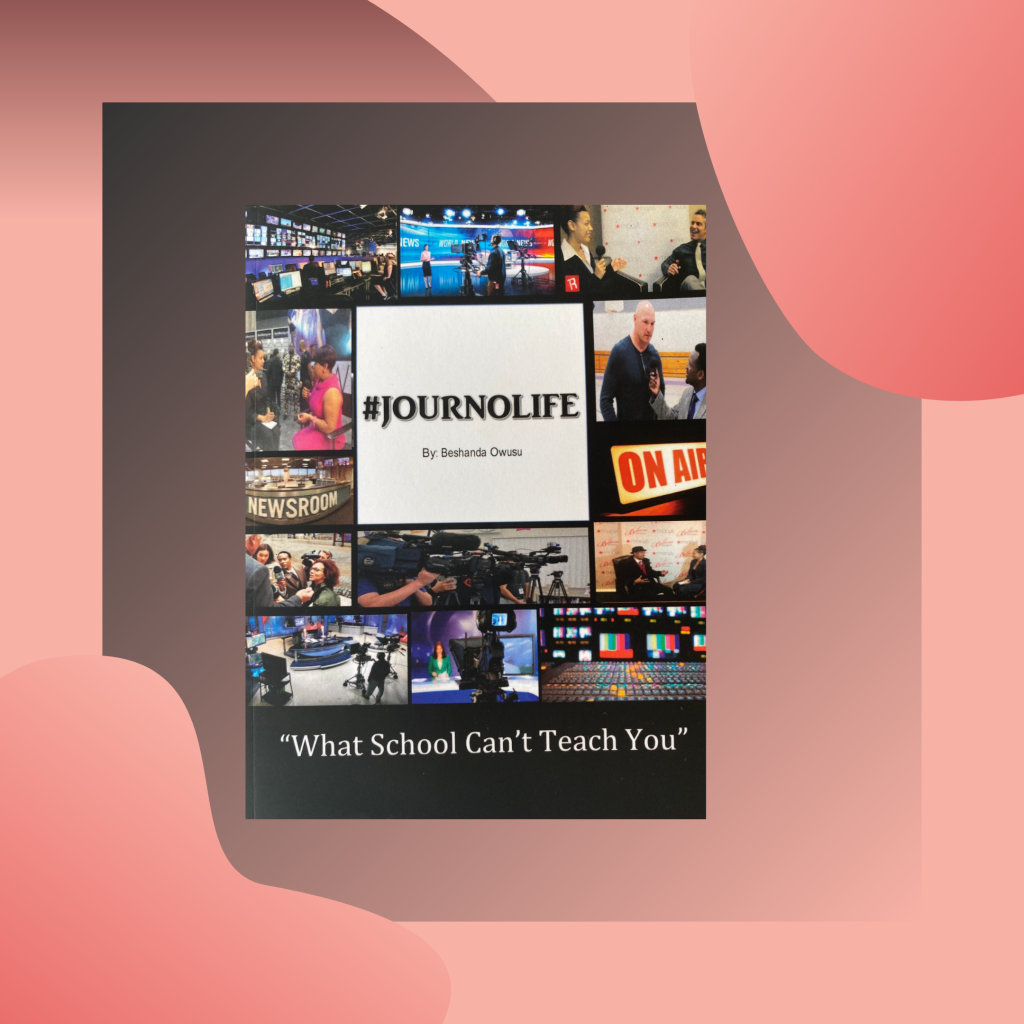
Beshanda Owusu is an Emmy-nominated journalist with over 15 years of experience. Her professional goal was to be a reporter. She believes her high school yearbook caption read something along the lines of: “You’ll see me reporting live on Channel 7.” Like many aspiring broadcast journalists, Her path took several turns before she found level ground. She earned her master’s degree in journalism from Columbia College Chicago within one year of obtaining a bachelor’s degree from Northern Illinois University. Her debut publication, #JOURNOLIFE, is a culmination of professional experiences that give a different perspective to your regularly scheduled news program.
#JOURNOLIFE is a collection of real-life stories from journalists who all took different paths to reach their ultimate goal of working in a newsroom. These stories are meant for aspiring journalists to learn how to navigate the newsroom with confidence. Each story offers a different lesson and a fresh perspective on situations you will encounter on your professional journey. With experiences, you will learn what to do and what not to do, what to look for in the newsroom, how to navigate personal and uncomfortable situations, tricks of the trade, and so much more.
In a time where fake news is real, old school journalistic principles must be adhered to, and working professionals must seriously consider their duties as journalists to be factual, accurate, and fair.
PWH: What sparked your interest in Journalism?
BO: My love for journalism started with writing. It’s always been how I expressed myself. In undergrad, I naturally gravitated to Broadcast Journalism. I enjoyed everything about it. I completed an internship at a television station every summer while earning my Bachelor’s Degree at Northern Illinois University, which helped me land my first job at CBS-2 in Chicago.
PWH: Can you describe the day in your life as a Journalist?
BO: I spent my career as an Assignment Editor. This position is commonly called the newsroom’s pulse because it’s where the information and instructions flow. My job was to know what was going on in the city at all times and determine how the station could cover it.
As most journalists do, I stayed abreast of the day’s news before going into work, watching newscasts, reading newspapers and listening to news radio en route to work. Aside from assisting in determining what news will be covered, the Assignment Editor handles the logistics of staff, including reporters, photographers, and editors, in terms of how the stories will be told. Throughout the day, I’m in constant contact with producers inside the newsroom and reporters in the field to ensure a steady flow of communication. Ensuring deadlines are met, fact-checking, securing interviews, reviewing press releases, and video are all daily functions of the job.
PWH: What are some challenges you have faced in your career?
BO: My first job was in the number 3 television market, Chicago. This means I was in my early 20’s working with veterans-people who’ve paid their dues and had been in the business for ten or more years. I initially struggled with my position because the essence of being an Assignment Editor (I started as an Assistant Assignment Editor) is determining what the reporters, editors, and photographers will do for the day – who they will work with, how many assignments they will have, if they’ll need to stay later, a lot of factors play into the position. I initially received a lot of pushback, and I didn’t know why. I wondered if it was because I was young. After all, I was a woman because I was African-American or because I was an African-American woman? I didn’t know. I honed my craft, learned all I could as quickly as possible, and brought my A-game every day. I treated everyone as I wanted to be treated, and while everyone didn’t do the same, I quickly gained the respect I deserved.
PWH: In your book #Journolife what is your message to readers?
BO: In Journalism or any career path you choose, make sure it’s worth it. Journalists sacrifice a lot – relationships, odd schedules, long hours, working holidays, sometimes low pay, working in extreme weather conditions, the list goes on. But having a front-row seat to history-making moments makes it worth it. Telling stories that inspire people to act makes it worth it. Finding the truth and speaking that truth makes it worth it.
PWH: What is next for you and your career?
BO: I am thrilled that #JOURNOLIFE is so well received. It has allowed me to speak at various universities and organizations and reach the next generation of journalists. The next phase of the book will be the launch of the #JOURNOLIFE website, which will be an informational hub for all things journalism.
I look forward to inspiring and helping those looking to enter the field as much as possible.
PWH: Life advice in general? (Words or philosophies that have guided/inspired/motivated you)
BO: Find your confidence and own it. If I could tell my younger self anything at all, it is to be confident in who you are and in your abilities. You’ve got this!
PWH: Bonus: What is your definition of a Pretty Woman Who Hustle’s?
BO: My definition of a Pretty Woman Who Hustles is a woman who is clear about who she is, what she wants, and goes about reaching her goals with style and grace.
To purchase Journolife visit https://www.amazon.com/Beshanda-Owusu/e/B07QN3HCZH?ref_=pe_1724030_132998060

